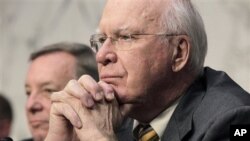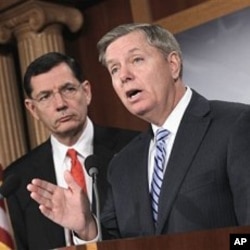It has been almost a year since President Barack Obama signed the sweeping health-care reform act into law in the United States. But the political and legal battles over the law continue to rage.
Democrats in the U.S. Senate rallied to defend the president’s signature health-care law in the wake of another legal setback for the law this week in Florida.
On Monday, a federal judge in Florida ruled the law was unconstitutional because part of the statute requires Americans to buy health insurance. That was the second federal-court ruling against the new law. Two other federal judges have upheld it.
Senate Democrats held a hearing Wednesday to discuss whether the health-care law is constitutional, although that judgment is ultimately expected to come from the Supreme Court.
"They want to achieve in courts what they were unable to achieve in Congress," said Democrat Patrick Leahy of Vermont, who is chairman of the Senate Judiciary Committee. "This was debated for over a year."
Republicans have been inspired by the latest court ruling in Florida and vow to continue their efforts to repeal the health-care law.
The House of Representatives, now under Republican control, voted to repeal the law last month. But the chances for repeal in the Senate are poor since Democrats still hold a narrow majority.
Legal experts are also debating the health-care law, including several who testified before the Senate.
Georgetown University Professor Randy Barnett predicts the Supreme Court will eventually rule that the law is unconstitutional.
"In the United States, sovereignty rests with the people, with the citizenry," said Barnett. "And if Congress can mandate that you do anything that is convenient to its regulation of the national economy, then that relationship is now reversed. Congress would have all the discretionary power of a king, and the American people would be reduced to its subjects."
But another expert, Harvard University Professor Charles Fried, has a different view.
"I am not sure it is good policy," he said. "I am not sure it is going to make the country any better. But I am quite sure that the health-care mandate is constitutional."
President Obama spoke out in defense of the law in his recent State of the Union Address, although he also indicated a willingness to consider bipartisan changes to the law where possible.
"So I say to this chamber tonight, instead of refighting the battles of the last two years, let us fix what needs fixing and let us move forward," he said.
The politics of health-care reform in the United States are complicated. The president signed the reform act into law last year after it was passed in Congress with support from Democrats only.
Political analyst Charlie Cook says the health-care law remains a divisive issue in public-opinion polls.
"At best, the American people are evenly divided on health-care reform and this health-care proposal, at best," said Cook. "There is not a strong consensus to keep it. There is not a strong consensus to throw it out."
The latest Associated Press-GfK poll found 41 percent oppose the health care law, while 40 percent support it.
The legal challenges to the law are expected to work their way through the Federal Court system eventually up to the Supreme Court, but that process could take a year or two to complete.





